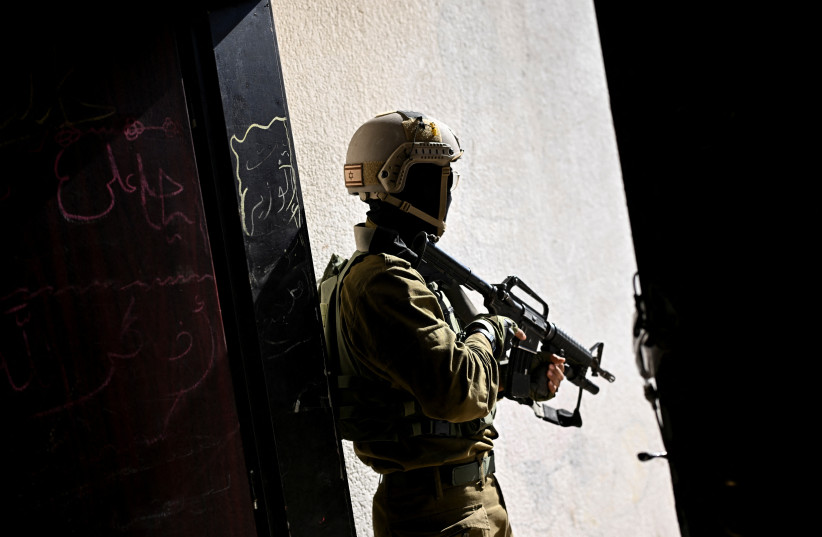The hopes that a ceasefire between Israel and Hamas would be reached before the beginning of the Muslim holy month of Ramadan next week appear to be fading as the sides are entrenched in their positions. On Thursday, exactly five months after the war between them began, the ability of Israel and Hamas to agree to terms of a truce is lacking.
Israel now faces increasing international pressure as the US and other countries warn of a developing humanitarian crisis in the Gaza Strip. In addition, there is concern within the Israeli defense establishment that heightened tensions ahead of Ramadan could translate into further violence both in the West Bank and Jerusalem.
Israel’s Channel 12 obtained an Israeli military intelligence assessment that warned of such an escalation. “Religious triggers…may lead to an escalation on multiple arenas and even a regional escalation during Ramadan, turning the war into a religious war,” the document read.
Easing access to al-Aqsa
Perhaps influenced by the grim forecast, Israeli Prime Minister Benjamin Netanyahu decided against restricting access to one of Islam's holiest sites—located in Jerusalem—in an attempt to diffuse the rising tensions. Netanyahu ignored the calls from far-right elements within his government to limit access of Palestinians to the al-Aqsa mosque. There were also calls to limit the access of Arab citizens to Israel, a highly controversial move that would have likely sparked violence and further international condemnation.
Any minor incident in Jerusalem could potentially trigger a domino effect in an already simmering area. In 2021, clashes surrounding Israeli restrictions on access to the al-Aqsa Mosque compound during Ramadan led to a war between Israel and the Hamas-controlled Gaza Strip. This time, the war could threaten to combust further.
“Israel would prefer a ceasefire during Ramadan because it could escalate very easily,” said Professor Jonathan Rynhold, head of the Department of Political Studies at Bar-Ilan University. “The defense establishment appears to be in favor of a ceasefire if Israel receives reasonable terms.”

Those favorable terms are now reportedly increasingly out of reach.
Rising tensions in the north
Also, tensions on Israel’s northern border are rising as the Lebanese-based Hezbollah terror organization and Israel continue to exchange fire, threatening to engulf the region in flames further. Hezbollah began firing at Israel days after the war in Gaza began, and the sides have traded mutual blows since, making a conscious effort to contain the conflict. However, Israel’s patience with Hezbollah appears to be waning, and senior Israeli officials have warned it’s only a matter of time before there’s a wider military operation.
On October 7, Hamas stunned Israel as hundreds of its terrorists stormed its southern border. In the violent rampage, they killed approximately 1200 Israelis, wounding thousands of others. The terrorist organization also kidnapped 250 people, most of them Israeli civilians. One hundred twenty-one were released a few weeks into the war as part of a deal with Israel that saw the release of 150 Palestinian prisoners from Israeli jails and an increase in the flow of humanitarian aid into the Gaza Strip.
Israel's ongoing operations in Gaza
In response to the attack, Israel launched a massive offensive against Hamas. Since then, the Hamas-run health ministry has reported the death of over 30,000 Palestinians and tens of thousands of others injured. Much of Gaza’s population has been displaced and moved to the southern Gazan city of Rafah, where the Israeli military has not operated yet. Over 240 Israeli soldiers have been killed in the ground operation in the Gaza Strip. In the process, Israel has destroyed thousands of tunnels, part of Hamas’ elaborate underground network that the terrorist group has used to fortify itself and attack Israel.
In recent weeks, the sides have been negotiating a temporary ceasefire that would reportedly see the release of part of the Israeli hostages. In return, Israel is expected to release more Palestinian prisoners from its jails, allow for more humanitarian aid to enter Gaza in addition to at least six weeks of a pause in the offensive, and allow at least some of the residents of the northern Gaza Strip to return to their homes. The mediators, Qatar, Egypt, and the US, have so far come up empty-handed. Reports say Hamas is demanding a permanent ceasefire, something Israel refuses to do as it vowed to destroy Hamas in the aftermath of October 7. Other reports say Hamas and Israel cannot agree on the names of Palestinian prisoners to be released, with Hamas insisting on the release of people convicted of severe acts of terrorism.

Israel’s main dilemma in its war against Hamas appears to be the timing of an operation in Rafah, which is now home to many of Gaza’s almost 2 million displaced people. Hamas leader Yahya Sinwar and other senior Hamas commanders are believed to be in the underground of either Rafah or Khan Yunis, a city in which Israel has been operating for several weeks. Sinwar is also thought to have surrounded himself with at least some of the Israeli hostages, further complicating matters. As Israel contemplates how to operate in Rafah—something it appears to be stuck on for several weeks—it needs to deal with the challenge of the huge population there. Allies of Israel, but also its adversaries, have warned of an operation in Rafah, raising concerns about its consequences and raising the stakes for Israel as it struggles to maintain international support for its war on Hamas.
“The US administration has yet to see an Israeli plan on Rafah that it is comfortable with,” Rynhold told The Media Line.
The question of arms sales
On Thursday, several media reports indicated that Washington was under growing domestic pressure to curb arms sales to Israel ahead of a possible Rafah military maneuver.
“The US still sees Israel as its strongest ally in the Middle East, and it is difficult to image a situation in which it will stop supplying Israel with weapons,” said Sharona Shir Zablodovsky, an expert on public policy, national security and Israel-diaspora relations at the Dvorah Forum. “But in the long run, Israel needs to start initiating moves to self-produce its weapons. No sovereign situation needs to find itself in such a situation.”

According to Shir Zablodovsky, an operation in Rafah is inevitable despite the complexities entailed.
“As a sovereign state, Israel must secure the release of its hostages, and therefore cannot avoid operating in Rafah,” she told The Media Line. “What needs to be carefully examined is how to operate in order to safeguard the civilian population that is not affiliated with Hamas. Israel needs to make the necessary adjustments while maintaining the commitment to operate in Rafah, which is why it is taking so long.”
Continued American support for the war
Israel’s war effort has been heavily supported by the US administration led by President Joe Biden. The US guaranteed the continuous replenishment of arms and supported Israel in international forums. The White House has become increasingly impatient with the Netanyahu government as the war lingers. Earlier in the week, Israeli war cabinet minister Benny Gantz was in Washington to meet with senior US officials in order to discuss the war. Since the beginning of the war, Gantz has emerged as Netanyahu’s main political rival as the Israeli premier’s approval ratings plummeted. Gantz’s US visit was criticized by the Israeli premier, who was informed of the visit only after it was finalized and not approved by Netanyahu as is customary. The Biden Administration, which has been very vocal in its criticism of the far-right elements of the Netanyahu government, seemed to be playing favorites meeting with Gantz, who is perceived as the more moderate element of the Israeli coalition.
The right-wing members of the Netanyahu government have been vociferous opponents of the increased flow of humanitarian aid to Gaza, sometimes critical of Netanyahu’s bowing to American pressure. They have also become increasingly impatient with the delay in the Rafah operation.
“The US is trying to shift the balance so that Netanyahu can say to those members – if you want to operate in Rafah, we need to do certain things, otherwise he can lay the blame on them – this kind of pressure helps Netanyahu,” said Rynhold, who said the reception Gantz received in Washington was an attempt to signal to Jerusalem that the US feels Israel is “not listening.”
“The US believes Israel is not paying sufficient regard to its part in the humanitarian situation,” he added.
Optimism on the prospects of a ceasefire and a hostage release deal has been replaced with pessimism recently. With no lull in the fighting, Israel is now faced with complex issues that could have far-reaching consequences.
